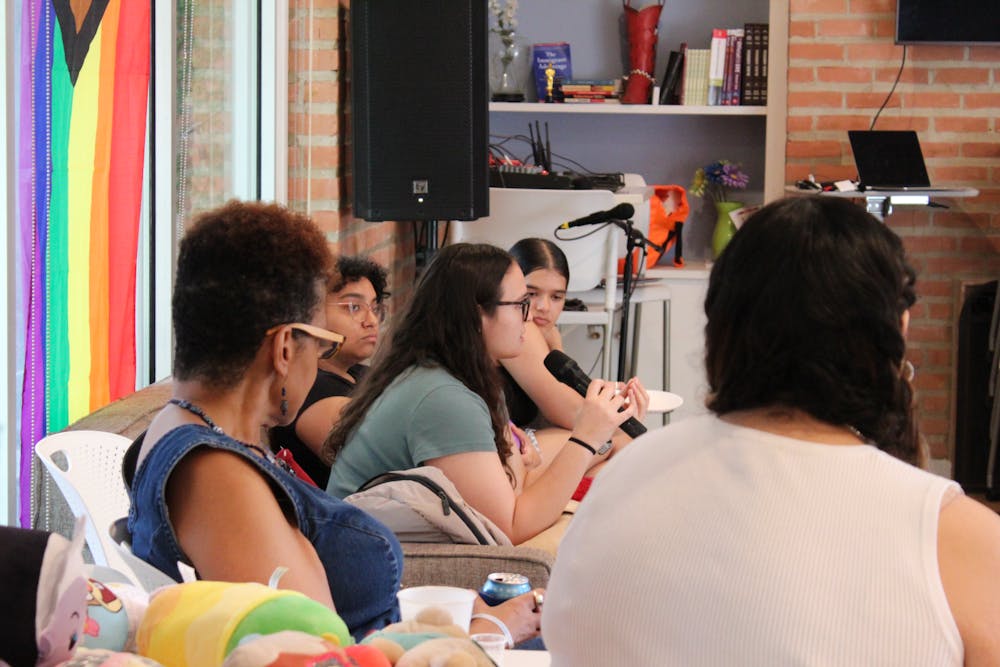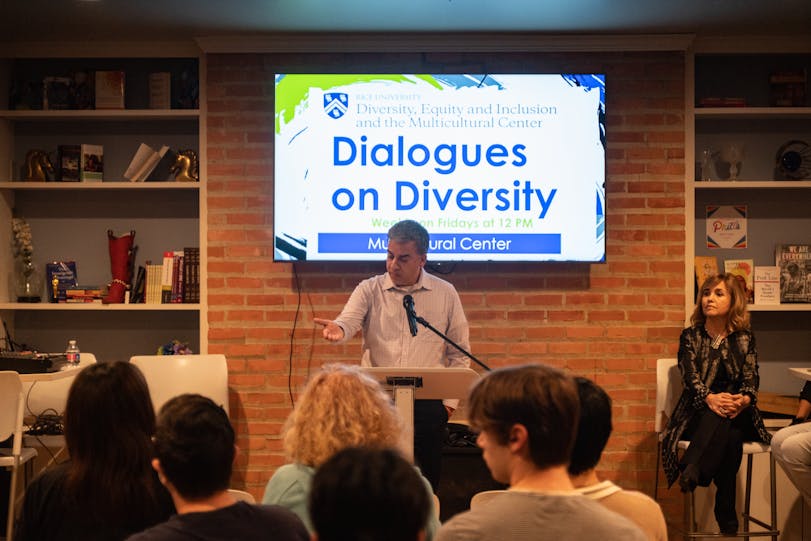Post election, students react with unease, hope

On the evening of Election Day, hundreds of students gathered in the Sid Richardson College commons, sitting chair-to-chair. They cheered when Rep. Colin Allred amassed votes, and again when Massachusetts went blue.
Then the tides shifted. Ted Cruz pulled ahead, winning re-election to the Senate. North Carolina, the first battleground state to be called, went red. The mood sombered.
By 10 p.m., students started to trickle out. By midnight, after another battleground state was called for president-elect Donald Trump, swaths of tables were empty. Only a few dozen students were left when Trump declared victory at 2:30 a.m.
Now, campus is grappling with last week’s decisive — and unexpected, some say — Republican victory. Amid town halls and discussion forums, students express both optimism and worry for the future ahead.
Campus events
The Diversity Council held a “processing space” Nov. 8, where about 25 students and faculty gathered in the Multicultural Center to discuss the election’s results. There, attendees expressed their concerns about the next four years, and reckoned with half of America voting for a man they said is “dangerous” and “bigoted.”

Lucia Fernandez, who attended the Diversity Council event, said that while she was upset by the results of the election, she was not particularly surprised.
“I wasn’t particularly hopeful that Kamala Harris was going to win the election,” Fernandez, a Lovett College senior, said. “We have not been able to get a woman in office … multiply that by multiple marginalized identities that Harris inhabits.”
However, Fernandez also said she rejects categorical assumptions about Trump voters.
“[People] are saying that you hate all people of color if you vote for Trump … This is an empathy problem, but this is also a problem of speak[ing] for other people and assum[ing], instead of listening, especially to those who are the most marginalized,” Fernandez said.
Omar Syed, vice president and general counsel for Rice, later fielded legal questions from students, faculty and staff at the MCC Nov. 11.
Topics discussed included immigrant rights, especially for undocumented immigrants, LGBTQ+ rights, financial aid, diversity and the potential dissolution of the Department of Education.
The audience often asked about Project 2025, a set of conservative policy proposals released by the Heritage Foundation. Syed said Project 2025, alongside much of Trump’s campaign rhetoric, is unlikely to have sweeping effects.
Still, many audience members expressed concern about the next four years. Some asked, anonymously, if transgender students would be able to receive gender-affirming healthcare. Others asked if the U.S. Immigration and Customs Enforcement would be allowed to apprehend people on campus, or if the university would have to disclose information about undocumented immigrants.
Student support measures Rice may consider include bringing immigration lawyers to campus more often, or highlighting emergency funds for students, Syed said.
Student reactions
Kyle Szekeres, president of Rice University College Republicans, said he was pleased with the results of the election. He attributed Trump’s victory to his messaging about the economy and illegal immigration, and tied Harris’ failure to larger issues with the Democratic Party — including an inability to connect with voters and insistence that Trump posed a threat to democracy.
“When [President Joe] Biden was still running, all [Democrats] were talking about was [Trump’s] threat to democracy. It was just not working,” Szekeres, a Jones College junior, said. “People did not care. You were like, ‘How does this affect me?’”
Szekeres said he was drawn to the Republican Party because of his dissatisfaction with the culture of the left. In particular, Szekeres said he was disappointed seeing his peers’ social media posts in the wake of Trump’s victory.
“I think it is a horrendous take, a very bad and hurtful take … that you cannot be friends with someone who voted against you,” Szekeres said.
Elsewhere on campus, the Rice Young Democrats mobilized Nov. 9 for a ballot curing event in an attempt to eke out final votes for Arizona’s Democratic senate contender, Ruben Gallego, in his race against Republican Kari Lake. Late Monday night, the Associated Press called the race in Gallego’s favor. About 50 students participated in the event.
Ballot curing allows voters to correct minor mistakes on mail-in ballots for their votes to count. Members of Rice Young Democrats called voters in Arizona with rejected ballots and if the voter said they voted for Gallego, helped them cure their ballots.
Will Howley and Anna Lee, both Brown College sophomores who attended the ballot curing event, said they found mixed success.
“I’ve called about two dozen people and nobody’s picked up,” Howley said.
Editor’s Note: Will Howley is a Thresher Backpage senior writer.
However, both remained motivated and said the ballot curing was a way for them to turn their unease about Trump’s re-election into action.
“These past few days, I’ve been feeling pretty angry,” Howley said. “I wanted to channel that into something more productive than [anger and dismay] about the future of our country,” Howley said.
Sammi Frey and Benjamin Kagan, the co-presidents of Rice Young Democrats, said they were empowered to organize the event due to the president-elect’s seeming disregard for democratic norms.
“This is a really scary time. Someone who does not care about democracy, and actually wants to attack it and dismantle it, is now in one of the biggest positions of power in the world,” Frey, a Hanszen College sophomore, said.
Kagan, a Baker College freshman, said although the election did not turn out in Democrats’ favor, he was still pleased by the strong civic presence on campus.
“It feels, to us, [like] there are a lot of students who are willing to go out and vote.” Kagan said. “We want to get students encouraged to — in addition to voting — go out and make these calls, go out and make an impact for crucial races.”
More from The Rice Thresher

O’Rourke rallies students in Academic Quad
Former U.S. Rep. Beto O’Rourke of El Paso, Texas spoke in front of the Sallyport to a sea of sunglasses and “end gun violence” signs April 17. The rally, organized by Rice Young Democrats, took place in the academic quad from noon to 2 p.m.

Five international visas revoked at Rice
Federal authorities have revoked visas for five international affiliates at Rice — three current students and two recent graduates, President Reginald DesRoches announced in an April 11 message to campus. The revocations are “not related to social activism or protests,” a university spokesperson told the Thresher.

Modified Beer Bike races rescheduled to April 18
Beer Bike races have been rescheduled for April 18 at 5-8 p.m. The makeup event was announced in an email to Beer Bike captains, coordinators and stakeholders, from the campuswide coordinators and the Bike Captains Planning Committee.

Please note All comments are eligible for publication by The Rice Thresher.